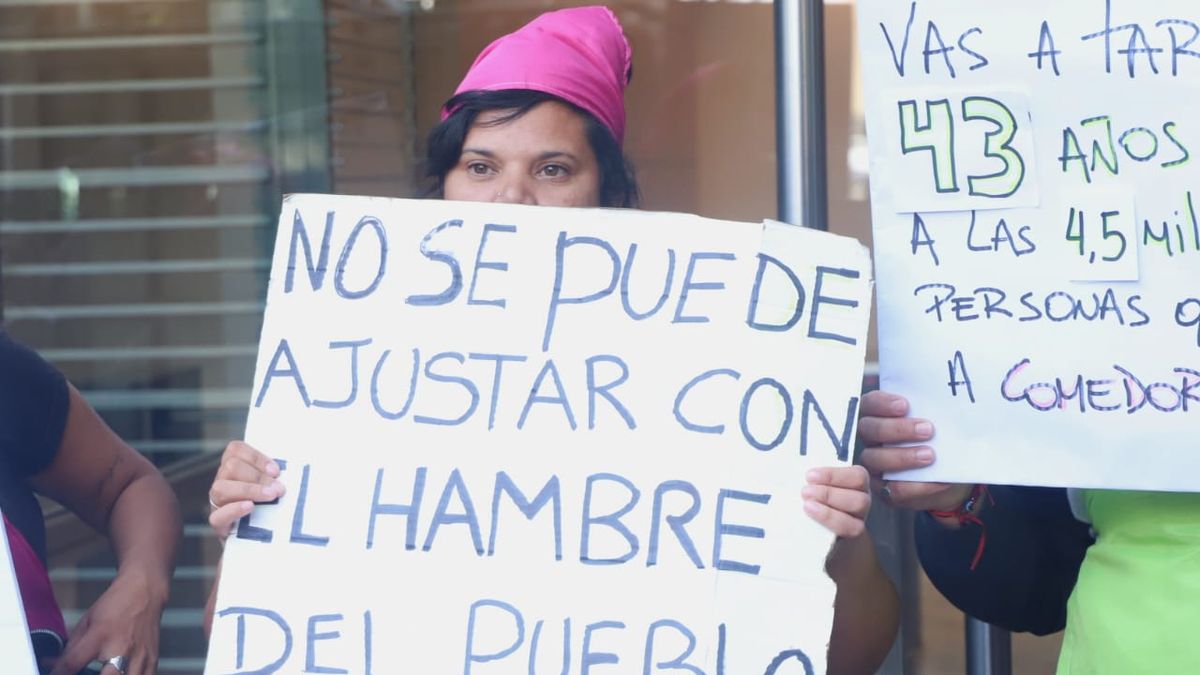To the indices of inflation known last Wednesday, a statistic was added that exalts the economic deterioration in Argentina: according to the Social Observatory of the Catholic University (UCA)he 57.4% of Argentines were below the poverty line in January 2024. In this context, the president Javier Milei He noted in an interview this Friday that the situation will deepen in the coming months: “The hardest time will be between March and April.”
The devaluation and subsequent rise in prices of basic basket products was one of the main points that led to this index, according to the report titled “Estimation of the effects of the post-devaluation Inflationary Impact. Scenario for December 2023 and January 2024“. It is estimated that about 27 million people are poor in Argentina.
At the same time, the study recorded an exponential growth in the situation of indigence from the country. In the third quarter of 2023, this index was 9.6%, which became 14.2% in December and reached 15% last Januarywhich would represent 7 million people. The increase is consistent with poverty figures: from 44.7% in the third quarter of last year, it rose to 49.5% in December and 57.4% in the last month. It’s about the highest figure since the UCA Social Observatory recorded povertyin 2004.
The data contemplated that, for January, the poverty basket in the AMBA for an adult person was $193,146 and for one typical family of $596,823, without considering the rent. The latest official data of the INDECcorresponding to first half of 2023threw a 40.1% poverty. The situation as of December will be known on March 27.
Poverty in Argentina: the reasons for the increase in the last month
In the document, the UCA specifies that the poverty projections for December 2023 and January 2024 were made by adjusting the labor and non-labor income for the third quarter 2023depending on the real variations in the wages and modifications in income and monetary transfer programs. In turn, the consumer baskets (CBA and CBT) were updated based on the variation in values estimated by the INDEC.
In this framework, it could be observed that of the households benefiting from social allowances the level of indigence In the third quarter of 2023 it stood at 19.7% of people, which became 28.8% in December and decreased in January to 23.8%, product of the increase in the value of the AUH and the food card. While the poverty in these families was 76.5% in the third quarter of 2023 and reached 85.5% in January past.
UCA Poverty January 2024.jfif
In his analysis, it is stated that the increase in poverty and destitution will deepen in Februarygiven that the assets of retirements and pensions remained unchanged in relation to December and January, there was no agreement to update minimum salary nor the unemployment benefit, it was not reached salary increases in most unions and worsened the fall in economic activitywith a decline in employment levels. Along with this, passenger transportation rates and meat prices increased.
Government celebrated financial surplus: “Zero deficit is not negotiated”
He National governmentthrough its social networks, highlighted the record of financial surplus in the National Public Sector during the month of January, which reached $518,408 million. As expressed by the president Javier Milei On Friday, the official account of the ruling party stated that “the zero deficit is not negotiated“. In the statement they detailed that the primary surplus was $2,010,746 million but $1,492,338 million were paid debt interest.
In the details of the figures presented by the Minister of Economy Luis Caputothe total income of the National Public Sector they reached the $6,147,232 million (an increase of 256.7% year-on-year), with a boost in tax collection that exceeded that of January 2023 by 256.9%, attributed “both to the performance of the foreign trade as of the internal economic activity“.
Regarding the foreign tradethe economic portfolio recorded an increase – in pesos – in export duties of 574.3%, that is, about $545,482 millionwhile import duties rose 377.3% year-on-year, which represents $207,943 million.
While the COUNTRY Tax also recorded a year-on-year increase of 1,302.3% ($442,174 million), and taxes linked to internal economic activity also rose: both the collection corresponding to VAT net of refunds ($949,317 million; 288.7% year-on-year) such as debits and credits ($379,947 million; +248.3%). Likewise, the income corresponding to the Contributions and Contributions to Social Security increased by $1,079,789 million (165.7%). Finally, during the month of January property rents increased $184,380 million (327.4%).
In the report, the Ministry of Economy of the Nation estimated that the primary expenditures of the National Public Sector In the month of January they reached $4,136,487 million, bringing the year-on-year increase to 114.6%. The benefits of the Social Security rose to $1,599,676 million (125%), which does not include the reinforcement of pension income (more than $266 billion). On the other hand, salaries reached $691,168 million (158.1% year-on-year).
Current transfers reached $1,406,927 million (114.6%), among which include those of the private sector, which showed a growth of $654,680 million (125.6%), and those of the public sector that reached $228,954 million ($95,222 million; +71.2%), among which financial assistance to universities stands out for $145,682 million ($85,940 million). Likewise, economic subsidies grew in $54,877 million (27.5%). In this way, it was recorded that the year-on-year increase in expenditures is less than that of income.
Source: Ambito




